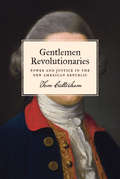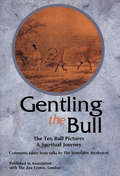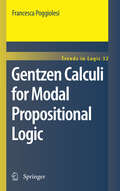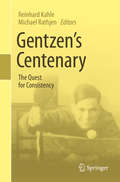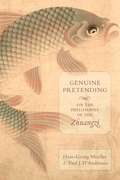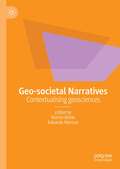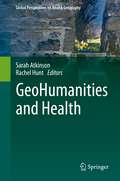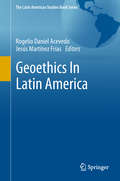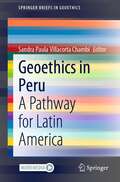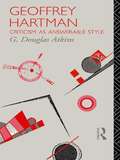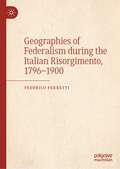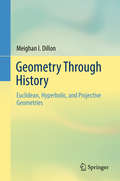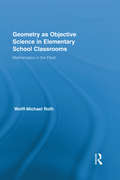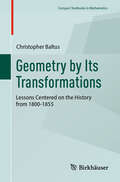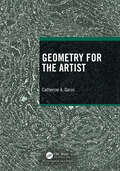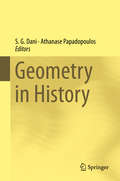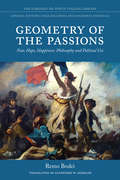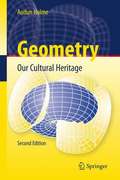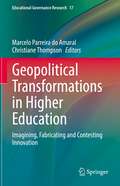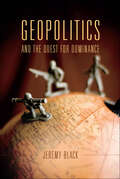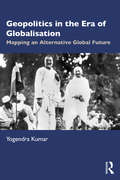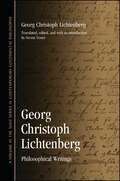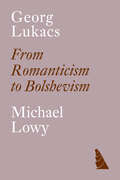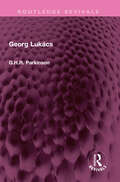- Table View
- List View
Gentlemen Revolutionaries: Power and Justice in the New American Republic
by Tom CutterhamIn the years between the Revolutionary War and the drafting of the Constitution, American gentlemen—the merchants, lawyers, planters, and landowners who comprised the independent republic's elite—worked hard to maintain their positions of power. Gentlemen Revolutionaries shows how their struggles over status, hierarchy, property, and control shaped the ideologies and institutions of the fledgling nation.Tom Cutterham examines how, facing pressure from populist movements as well as the threat of foreign empires, these gentlemen argued among themselves to find new ways of justifying economic and political inequality in a republican society. At the heart of their ideology was a regime of property and contract rights derived from the norms of international commerce and eighteenth-century jurisprudence. But these gentlemen were not concerned with property alone. They also sought personal prestige and cultural preeminence. Cutterham describes how, painting the egalitarian freedom of the republic's "lower sort" as dangerous licentiousness, they constructed a vision of proper social order around their own fantasies of power and justice. In pamphlets, speeches, letters, and poetry, they argued that the survival of the republican experiment in the United States depended on the leadership of worthy gentlemen and the obedience of everyone else.Lively and elegantly written, Gentlemen Revolutionaries demonstrates how these elites, far from giving up their attachment to gentility and privilege, recast the new republic in their own image.
Gentling the Bull
by Irmgard SchloeglThe Venerable Myokyo-ni is one of today's most distinguished teachers in the Rinzai Zen tradition. In Gentling the Bull she offers an insightful explanation of the .Ten Ox-Herding Pictures, showing how they are a metaphor of both one's Zen training and spiritual journey.The Ten Ox-Herding Pictures, also known as the Ten Bull Pictures, are believed to have been drawn by Kakuan, a twelfth century Chinese Zen master, but became widely used as a means of Zen study in fifteenth-century Japan. They are used in formal Zen training to this day to show the stages of one's realization of enlightenment. Each of the ten pictures is presented here with a preface and general foreword to the series by Chi-Yuan, a monk in the direct line of Kakuan. Myokyo-ni provides a lucid introduction that sets the pictures in their historical context and shows their relevance to modern Zen training. In her own comments on each picture, she discusses how they are representative of our own search for "oneness"- spiritual fulfillment.
Gentling the Bull
by Irmgard SchloeglThe Venerable Myokyo-ni is one of today's most distinguished teachers in the Rinzai Zen tradition. In Gentling the Bull she offers an insightful explanation of the .Ten Ox-Herding Pictures, showing how they are a metaphor of both one's Zen training and spiritual journey.The Ten Ox-Herding Pictures, also known as the Ten Bull Pictures, are believed to have been drawn by Kakuan, a twelfth century Chinese Zen master, but became widely used as a means of Zen study in fifteenth-century Japan. They are used in formal Zen training to this day to show the stages of one's realization of enlightenment. Each of the ten pictures is presented here with a preface and general foreword to the series by Chi-Yuan, a monk in the direct line of Kakuan. Myokyo-ni provides a lucid introduction that sets the pictures in their historical context and shows their relevance to modern Zen training. In her own comments on each picture, she discusses how they are representative of our own search for "oneness"- spiritual fulfillment.
Gentzen Calculi for Modal Propositional Logic
by Francesca PoggiolesiThe book is about Gentzen calculi for (the main systems of) modal logic. It is divided into three parts. In the first part we introduce and discuss the main philosophical ideas related to proof theory, and we try to identify criteria for distinguishing good sequent calculi. In the second part we present the several attempts made from the 50's until today to provide modal logic with Gentzen calculi. In the third and and final part we analyse new calculi for modal logics, called tree-hypersequent calculi, which were recently introduced by the author. We show in a precise and clear way the main results that can be proved with and about them.
Gentzen's Centenary
by Reinhard Kahle Michael RathjenGerhard Gentzen has been described as logic's lost genius, whom Gödel called a better logician than himself. This work comprises articles by leading proof theorists, attesting to Gentzen's enduring legacy to mathematical logic and beyond. The contributions range from philosophical reflections and re-evaluations of Gentzen's original consistency proofs to the most recent developments in proof theory. Gentzen founded modern proof theory. His sequent calculus and natural deduction system beautifully explain the deep symmetries of logic. They underlie modern developments in computer science such as automated theorem proving and type theory.
Genuine Pretending: On the Philosophy of the Zhuangzi
by Hans-Georg Moeller Paul J. D'AmbrosioGenuine Pretending is an innovative and comprehensive new reading of the Zhuangzi that highlights the critical and therapeutic functions of satire and humor. Hans-Georg Moeller and Paul J. D’Ambrosio show how this Daoist classic, contrary to contemporary philosophical readings, distances itself from the pursuit of authenticity and subverts the dominant Confucianism of its time through satirical allegories and ironical reflections.With humor and parody, the Zhuangzi exposes the Confucian demand to commit to socially constructed norms as pretense and hypocrisy. The Confucian pursuit of sincerity establishes exemplary models that one is supposed to emulate. In contrast, the Zhuangzi parodies such venerated representations of wisdom and deconstructs the very notion of sagehood. Instead, it urges a playful, skillful, and unattached engagement with socially mandated duties and obligations. The Zhuangzi expounds the Daoist art of what Moeller and D’Ambrosio call “genuine pretending”: the paradoxical skill of not only surviving but thriving by enacting social roles without being tricked into submitting to them or letting them define one’s identity. A provocative rereading of a Chinese philosophical classic, Genuine Pretending also suggests the value of a Daoist outlook today as a way of seeking existential sanity in an age of mass media’s paradoxical quest for originality.
Geo-societal Narratives: Contextualising geosciences
by Martin Bohle Eduardo MaroneThis book provides an accessible overview of the societal relevance of contemporary geosciences. Engaging various disciplines from humanities and social sciences, the book offers philosophical, cultural, economic, and geoscientific insights into how to contextualise geosciences in the node of Culture and Nature.The authors introduce two perspectives of societal geosciences, both informed by the lens of geoethics. Throughout the text core themes are explored; human agency, the integrity of place, geo-centricity, economy and climate justice, subjective sense-making and spirituality, nationalism, participatory empowerment and leadership in times of anthropogenic global change. The book concludes with a discussion on culture, education, or philosophy of science as aggregating concepts of seemingly disjunct narratives.The diverse intellectual homes of the authors offer a rich resource in terms of how they perceive human agency within the Earth system. Two geoscientific perspectives and fourteen narratives from various cultural, social and political viewpoints contextualise geosciences in the World(s) of the Anthropocene.
GeoHumanities and Health (Global Perspectives on Health Geography)
by Sarah Atkinson Rachel HuntThis volume brings together research in the GeoHumanities from various intellectual perspectives to illustrate the benefits of humanities-inspired approaches in understanding and confronting historically entrenched and recently emergent health-related challenges. In three main sections, this volume seeks to foreground the richness of work entangling medicine and health with the concerns of geography and of the Humanities. This volume will be of interest to academics and researchers in the Geographies of health and medicine, social sciences in GeoHumanities, and health humanities, and students in programs focusing on the humanities and health. In the book's first section, Bodies, the authors explore the material, sensory and more than physical capacities of bodies in accounting for experiences of death, air raids, immigration, dance therapy, asthma and blindness. Section two, Voice, addresses the nature of evidence, HIV/AIDS policy, patient voices in animal research, homelessness, and constructions of truth. The final section, Practice, focuses on creative writing, as well as the pedagogic tools of teaching with the asylum, the creative practice of nuclear emergency planning zones, arts-based care for the elderly, and cartographic practices within health research.
Geoethics In Latin America (The Latin American Studies Book Series)
by Rogelio Daniel Acevedo Jesús Martínez FríasThis book studies geoethics in Latin America and offers comprehensive research on geoethics and geoeducation. Its respective chapters explore geoethics in relation to UNESCO geoparks, mining activities in Latin America, natural hazards and risk management. Geoethics is a key discipline in the field of Earth and Planetary Sciences, and not only includes scientific, technological, methodological and social-cultural aspects, but also addresses the need to consider appropriate protocols, scientific integrity issues and a code of good practice when studying the abiotic world.The position of Latin America’s recently created geoethics associations is based on protection of the environment, together with a reassurance that the balance of nature and the rights of human beings to enjoy it will be preserved.
Geoethics in Peru: A Pathway for Latin America (SpringerBriefs in Geoethics)
by Sandra Paula Villacorta ChambiThe book discusses geoscience issues in Peru from a geoethical perspective, based on the leading experience of the Peruvian section of the International Association for Promoting Geoethics, in its seven years of activity.The introduction will present past and current activities to promote geoethics in Peru, such as the organization of the MinerLima exhibition (that has teaching purposes); the implementation of geoethics in georisk communication with vulnerable populations, as well as the promotion of adequate knowledge about national geological heritage. The other chapters will describe the main geoethical issues in Peru, related to georisk management and communication, mining, paleontology and geoheritage, geoducation. Some proposals for actions that should be taken to improve societal awareness and to make progress in problem-solving from a geoethical perspective will be discussed for each issue.In the final chapter Peruvian geoescience implications and new roles for geoscientists will be discussed, providing clues to their participation in the management of socio-environmental problems that affect Latin American region. It will be also underlined how geoethics represents a new theoretical and practical approach that may contribute in the current process to modernize geoscience education in Latin America.In this sense, this publication provides a solid base to apply the theoretical framework of Geoethics in Peru that may be suggested as an example to promote geoethics in other Latin American countries. As a result, the need to inform and prepare the population of growing countries such as Peru to face the problems of the modern world is evident.In order to attract more readers in Latin America, each chapter will be provided with a summary in Spanish.
Geoffrey Hartman: Criticism as Answerable Style (Critics of the Twentieth Century)
by G. Douglas Atkins`The critic explicitly acknowledges his dependence on prior words that make his word a kind of answer. He calls to other texts "that they might answer him."' Geoffrey Hartman is the first book devoted to an exploration of the `intellectual poetry' of the critic who, whether or not he `represents the future of the profession', is a unique and major voice in twentieth-century criticism. Professor Atkins explains clearly Hartman's key ideas and places his work in the contexts of Romanticism and Judaism on which he has written extensively. In Geoffrey Hartman he provides a valuable introduction to a major critical voice who has called into question our assumptions about the distinction between commentary and imaginative literature.
Geographies of Federalism during the Italian Risorgimento, 1796–1900
by Federico FerrettiCombining intellectual history, geography and political science, this book addresses the relations between geography and the federalist tendencies of key individuals during the nineteenth-century Italian Risorgimento. The book investigates the development of transnational federalist attitudes amongst a political network of intellectuals, and hones in on several understudied figures who played important roles in the Italian radical movements for national and social liberation. Notably, this includes political geographers who mobilised geographical metaphors to foster change and reorganise territories. The author demonstrates how federalism, anarchism and republicanism were all connected and led not only to autonomy in Italy, but more locally within its regions and municipalities, and more broadly across Europe over the ‘Long Risorgimento’ period. Contributing to current debates on federalism and anti-colonialism, this book will appeal to historical geographers, political scientists and those researching the history of federalism, republicanism and anarchism in Europe.
Geometry Through History: Euclidean, Hyperbolic, And Projective Geometries
by Meighan I. DillonPresented as an engaging discourse, this textbook invites readers to delve into the historical origins and uses of geometry. The narrative traces the influence of Euclid’s system of geometry, as developed in his classic text The Elements, through the Arabic period, the modern era in the West, and up to twentieth century mathematics. Axioms and proof methods used by mathematicians from those periods are explored alongside the problems in Euclidean geometry that lead to their work. Students cultivate skills applicable to much of modern mathematics through sections that integrate concepts like projective and hyperbolic geometry with representative proof-based exercises.For its sophisticated account of ancient to modern geometries, this text assumes only a year of college mathematics as it builds towards its conclusion with algebraic curves and quaternions. Euclid’s work has affected geometry for thousands of years, so this text has something to offer to anyone who wants to broaden their appreciation for the field.
Geometry as Objective Science in Elementary School Classrooms: Mathematics in the Flesh (Routledge International Studies in the Philosophy of Education)
by Wolff-Michael RothThis study examines the origins of geometry in and out of the intuitively given everyday lifeworlds of children in a second-grade mathematics class. These lifeworlds, though pre-geometric, are not without model objects that denote and come to anchor geometric idealities that they will understand at later points in their lives. Roth's analyses explain how geometry, an objective science, arises anew from the pre-scientific but nevertheless methodic actions of children in a structured world always already shot through with significations. He presents a way of understanding knowing and learning in mathematics that differs from other current approaches, using case studies to demonstrate contradictions and incongruences of other theories – Immanuel Kant, Jean Piaget, and more recent forms of (radical, social) constructivism, embodiment theories, and enactivism – and to show how material phenomenology fused with phenomenological sociology provides answers to the problems that these other paradigms do not answer.
Geometry by Its Transformations: Lessons Centered on the History from 1800-1855 (Compact Textbooks in Mathematics)
by Christopher BaltusThis textbook combines the history of synthetic geometry, centered on the years 1800-1855, with a theorem-proof exposition of the geometry developed in those years. The book starts with the background needed from Euclid’s Elements, followed by chapters on transformations, including dilation (similitude), homology, homogeneous coordinates, projective geometry, inversion, the Möbius transformation, and transformation geometry as in French schoolbooks of 1910. Projective geometry is presented by tracing its path through the work of J. V. Poncelet, J. Steiner, and K. G. C. von Staudt. Extensive exercises are included, many from the period studied. The prerequisites for approaching this course are knowledge of high school geometry and enthusiasm for mathematical demonstration. This textbook is ideal for a college geometry course, for self-study, or as preparation for the study of modern geometry.
Geometry for the Artist
by Catherine A. GoriniGeometry for the Artist is based on a course of the same name which started in the 1980s at Maharishi International University. It is aimed both at artists willing to dive deeper into geometry and at mathematicians open to learning about applications of mathematics in art. The book includes topics such as perspective, symmetry, topology, fractals, curves, surfaces, and more. A key part of the book’s approach is the analysis of art from a geometric point of view—looking at examples of how artists use each new topic. In addition, exercises encourage students to experiment in their own work with the new ideas presented in each chapter. This book is an exceptional resource for students in a general-education mathematics course or teacher-education geometry course, and since many assignments involve writing about art, this text is ideal for a writing-intensive course. Moreover, this book will be enjoyed by anyone with an interest in connections between mathematics and art. Features Abundant examples of artwork displayed in full color Suitable as a textbook for a general-education mathematics course or teacher-education geometry course Designed to be enjoyed by both artists and mathematicians
Geometry in History
by Athanase Papadopoulos S. G. DaniThis is a collection of surveys on important mathematical ideas, their origin, their evolution and their impact in current research. The authors are mathematicians who are leading experts in their fields. The book is addressed to all mathematicians, from undergraduate students to senior researchers, regardless of the specialty.
Geometry of the Passions: Fear, Hope, Happiness: Philosophy and Political Use (Lorenzo Da Ponte Italian Library)
by Remo Bodei Gianpiero W. DoeblerThe passions have long been condemned as a creator of disturbance and purveyor of the temporary loss of reason, but as Remo Bodei argues in Geometry of the Passions, we must abandon the perception that order and disorder are in a constant state of collision. By means of a theoretical and historical analysis, Bodei interprets the relationship between passion and reason as a conflict between two complementary logics. Geometry of the Passions investigates the paradoxical conflict-collaboration between passions and reason, and between individual and political projects. Tracing the roles passion and reason have played throughout history, including in the political agendas of Descartes, Hobbes, and the French Jacobins, Geometry of the Passions reveals how passion and reason may be used as a vehicle for affirmation rather than self-enslavement.
Geometry: Our Cultural Heritage
by Audun HolmeThis book contains selected topics from the history of geometry, with "modern" proofs of some of the results, as well as a fully modern treatment of selected basic issues in geometry. It is geared towards the needs of future mathematics teachers. All too often the geometry which goes into the syllabus for these students presents the material in a pedantic and formalistic style, suppressing its dynamic character and its role as part of the foundation of our common cultural heritage. As such, one of my goals is to open up these aspects of the field; another is to extend an invitation to mathematics in general. It is an unfortunate fact that today, at a time when mathematics and knowledge of mathematics are more important than ever, phrases like math avoidance and math anxiety are very much in the public vocabulary. Making a serious effort to heal these ills is an essential task. Thus the book also aims at an informed public, interested in making a new beginning in math. <p><p> For the 2nd edition, some of the historical material giving historical context has been expanded and numerous illustrations have been added. The main difference is however the inclusion of a large number of exercises with some suggestions for solutions.
Geopolitical Transformations in Higher Education: Imagining, Fabricating and Contesting Innovation (Educational Governance Research #17)
by Christiane Thompson Marcelo Parreira do AmaralThis book discusses the central role education and research play in generating both value and comparative advantages in the (imageries of) global competition, competitiveness and transnational value chains. They are seen as assets placed at the forefront of developments that are arguably reshaping individuals, society and economy. This edited volume explores these developments in terms of changing relations between society, economy, science and individuals. The idea that we live in global knowledge societies and knowledge-based economies or that present-day productive systems constitute an industry 4.0 have gained currency as descriptions of contemporary society that are said to bear direct and indirect consequences for political, economic, and social orders. In this context, innovation, science and education are central themes in contemporary discussions about the future of modern societies. Innovation is enthusiastically embraced as the panacea for all sorts of societal issues of our times; science is equally deemed to play a decisive role in solving current problems and in heralding a bright future with more wealth and more welfare for all citizens; education is conferred the task to producing individuals equipped with both skills and competences considered key to innovation but also displaying the attitudes and dispositions that will secure continuous innovation and economic growth.
Geopolitics and the Quest for Dominance
by Jeremy BlackHistory and geography delineate the operation of power, not only its range but also the capacity to plan and the ability to implement. Approaching state strategy and policy from the spatial angle, Jeremy Black argues that just as the perception of power is central to issues of power, so place, and its constraints and relationships, is partly a matter of perception, not merely map coordinates. Geopolitics, he maintains, is as much about ideas and perception as it is about the actual spatial dimensions of power. Black's study ranges widely, examining geography and the spatial nature of state power from the 15th century to the present day. He considers the rise of British power, geopolitics and the age of Imperialism, the Nazis and World War II, and the Cold War, and he looks at the key theorists of the latter 20th century, including Henry Kissinger, Francis Fukuyama and Samuel P. Huntington, Philip Bobbitt, Niall Ferguson, and others.
Geopolitics in the Era of Globalisation: Mapping an Alternative Global Future
by Yogendra KumarThis book presents an alternative roadmap for a world characterised by geopolitical uncertainty. The surging expectations about a future world of democratic values and high economic growth, born out of superpower bonhomie at the end of the Cold War, did not lead to the promised outcomes. Instead we are faced with deeply destabilising challenges, like climate change, widespread state fragility, terrorism, arms race, disruptive newer technologies, global economic volatility, and ineffectiveness of multilateral institutions, old and new. The volume: surveys the intellectual discourse, the attempts to redesign the global institutions, and the geopolitical trends since the end of the Cold War for an understanding of the contemporary geopolitics, analyses the characteristics of the contemporary geopolitics, the seeming intractability of the global challenges, and the ongoing discourse about preventing their further deterioration, foregrounds the Gandhian praxis and IR theory for managing power transitions anchored in non-violent mobilisation of empowered masses, ensuring institutional resilience, and illustrates them through ongoing conflicts in Iraq and Afghanistan, outlines an approach, based on the Gandhian experience of managing political change, towards conflict, geopolitical uncertainties, and institutional ineffectiveness for securing a better future globally, including South Asia. Accessibly written, this volume will be indispensable for foreign policy experts, government think tanks, and career bureaucrats. It will also be essential for scholars and researchers of international relations, foreign policy, politics, and governance and public policy.
Georg Christoph Lichtenberg: Philosophical Writings (SUNY series in Contemporary Continental Philosophy)
by Georg Christoph LichtenbergAdmired by philosophers such as Schopenhauer, Nietzsche, Kierkegaard, Freud, Benjamin, and Wittgenstein, Georg Christoph Lichtenberg (1742–1799) is known to the English-speaking world mostly as a satirist. An eminent experimental physicist and mathematician, Lichtenberg was knowledgeable about the philosophical views of his time, and interested in uncovering the philosophical commitments that underlie our common beliefs. In his notebooks (which he called his Waste Books) he often reflects on, challenges, and critiques these philosophical commitments and the dominant views of the Enlightenment, German idealism, and British empiricism. This scholarly collection of Lichtenberg's philosophical aphorisms contains hundreds of trenchant observations drawn from these notebooks, many of which have been translated into English here for the first time. It also includes a historical and philosophical introduction to his writings, situating him in the history of philosophy and ideas, and is supplemented with a chronology, suggestions for further reading, and extensive introductory and textual notes explaining his references.
Georg Lukacs: From Romanticism to Bolshevism
by Michael LöwyOn the 100th anniversary of the publication of History and Class Consciousness, a new edition of this indispensable guide to Lukacs's thought and politicsThe philosophical and political development that converted Georg Lukács from a distinguished representative of Central European aesthetic vitalism into a major Marxist theorist and Communist militant has long remained an enigma.In this this now classic study, Michael Löwy for the first time traced and explained the extraordinary mutation that occurred in Lukács's thought between 1909 and 1929. Utilizing many as yet unpublished sources, Löwy meticulously reconstructed the complex itinerary of Lukács's thinking as he gradually moved towards his decisive encounter with Bolshevism.The religious convictions of the early Lukács, the peculiar spell exercised on him and on Max Weber by Dostoyevskyan images of pre-revolutionary Russia, the nature of his friendships with Ernst Bloch and Thomas Mann, were amongst the discoveries of the book.Then, in a fascinating case-study in the sociology of ideas, Löwy showed how the same philosophical problematic of Lebensphilosophie dominated the intelligentsias of both Germany and Hungary in the pre-war period, yet how the different configurations of social forces in each country bent its political destiny into opposite directions. The famous works produced by Lukács during and after the Hungarian Commune—Tactics and Ethics, History and Class Consciousness and Lenin—were analysed and assessed. A concluding chapter discussed Lukács's eventual ambiguous settlement with Stalinism in the thirties, and its coda of renewed radicalism in the final years of his life.In this new edition, Löwy has added a substantial new introduction which reassess the nature of Lukacs's thought in the light of newly published texts and debates.
Georg Lukács (Routledge Revivals)
by G.H.R. ParkinsonFirst published in 1977, Georg Lukács gives an outline of Lukács’ views and explains how they are related to the relevant cultural traditions of his epoch. The author covers the whole range of Lukács’ thought, from his earliest literary criticism to the posthumous Ontology of Social Existence. Lukács’ early writings in particular are frequently obscure in style and impregnated with the language and thought of Hegel. Professor Parkinson has elucidated Lukács’ principal writings in systematic fashion, and the book includes a detailed exposition of Lukács’ influential but difficult book History and Class Consciousness. This should be an indispensable book for all those who seek a clear, comprehensible introduction to the writings of one of the most influential Marxist thinkers of our time.
